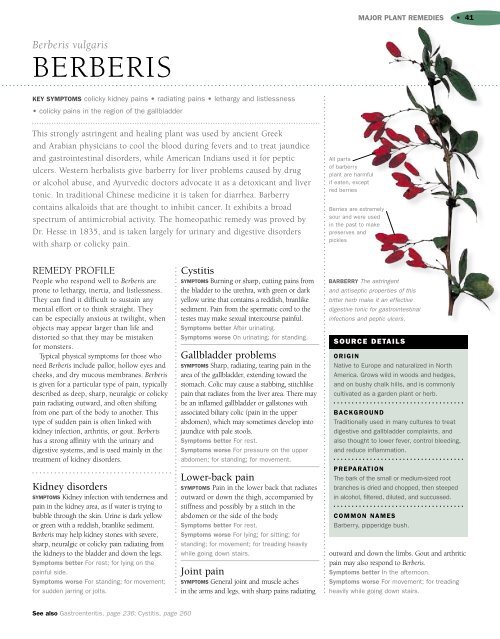Encyclopedia of Homeopathy
Encyclopedia of Homeopathy
Encyclopedia of Homeopathy
Create successful ePaper yourself
Turn your PDF publications into a flip-book with our unique Google optimized e-Paper software.
MAJOR PLANT REMEDIES• 41Berberis vulgarisBERBERISKEY SYMPTOMS colicky kidney pains • radiating pains • lethargy and listlessness• colicky pains in the region <strong>of</strong> the gallbladderThis strongly astringent and healing plant was used by ancient Greekand Arabian physicians to cool the blood during fevers and to treat jaundiceand gastrointestinal disorders, while American Indians used it for pepticulcers. Western herbalists give barberry for liver problems caused by drugor alcohol abuse, and Ayurvedic doctors advocate it as a detoxicant and livertonic. In traditional Chinese medicine it is taken for diarrhea. Barberrycontains alkaloids that are thought to inhibit cancer. It exhibits a broadspectrum <strong>of</strong> antimicrobial activity. The homeopathic remedy was proved byDr. Hesse in 1835, and is taken largely for urinary and digestive disorderswith sharp or colicky pain.All parts<strong>of</strong> barberryplant are harmfulif eaten, exceptred berriesBerries are extremelysour and were usedin the past to makepreserves andpicklesREMEDY PROFILEPeople who respond well to Berberis areprone to lethargy, inertia, and listlessness.They can find it difficult to sustain anymental effort or to think straight. Theycan be especially anxious at twilight, whenobjects may appear larger than life anddistorted so that they may be mistakenfor monsters.Typical physical symptoms for those whoneed Berberis include pallor, hollow eyes andcheeks, and dry mucous membranes. Berberisis given for a particular type <strong>of</strong> pain, typicallydescribed as deep, sharp, neuralgic or colickypain radiating outward, and <strong>of</strong>ten shiftingfrom one part <strong>of</strong> the body to another. Thistype <strong>of</strong> sudden pain is <strong>of</strong>ten linked withkidney infection, arthritis, or gout. Berberishas a strong affinity with the urinary anddigestive systems, and is used mainly in thetreatment <strong>of</strong> kidney disorders.Kidney disordersSYMPTOMS Kidney infection with tenderness andpain in the kidney area, as if water is trying tobubble through the skin. Urine is dark yellowor green with a reddish, branlike sediment.Berberis may help kidney stones with severe,sharp, neuralgic or colicky pain radiating fromthe kidneys to the bladder and down the legs.Symptoms better For rest; for lying on thepainful side.Symptoms worse For standing; for movement;for sudden jarring or jolts.CystitisSYMPTOMS Burning or sharp, cutting pains fromthe bladder to the urethra, with green or darkyellow urine that contains a reddish, branlikesediment. Pain from the spermatic cord to thetestes may make sexual intercourse painful.Symptoms better After urinating.Symptoms worse On urinating; for standing.Gallbladder problemsSYMPTOMS Sharp, radiating, tearing pain in thearea <strong>of</strong> the gallbladder, extending toward thestomach. Colic may cause a stabbing, stitchlikepain that radiates from the liver area. There maybe an inflamed gallbladder or gallstones withassociated biliary colic (pain in the upperabdomen), which may sometimes develop intojaundice with pale stools.Symptoms better For rest.Symptoms worse For pressure on the upperabdomen; for standing; for movement.Lower-back painSYMPTOMS Pain in the lower back that radiatesoutward or down the thigh, accompanied bystiffness and possibly by a stitch in theabdomen or the side <strong>of</strong> the body.Symptoms better For rest.Symptoms worse For lying; for sitting; forstanding; for movement; for treading heavilywhile going down stairs.Joint painSYMPTOMS General joint and muscle achesin the arms and legs, with sharp pains radiatingBARBERRY The astringentand antiseptic properties <strong>of</strong> thisbitter herb make it an effectivedigestive tonic for gastrointestinalinfections and peptic ulcers.SOURCE DETAILSORIGINNative to Europe and naturalized in NorthAmerica. Grows wild in woods and hedges,and on bushy chalk hills, and is commonlycultivated as a garden plant or herb.BACKGROUNDTraditionally used in many cultures to treatdigestive and gallbladder complaints, andalso thought to lower fever, control bleeding,and reduce inflammation.PREPARATIONThe bark <strong>of</strong> the small or medium-sized rootbranches is dried and chopped, then steepedin alcohol, filtered, diluted, and succussed.COMMON NAMESBarberry, pipperidge bush.outward and down the limbs. Gout and arthriticpain may also respond to Berberis.Symptoms better In the afternoon.Symptoms worse For movement; for treadingheavily while going down stairs.See also Gastroenteritis, page 236; Cystitis, page 260
















